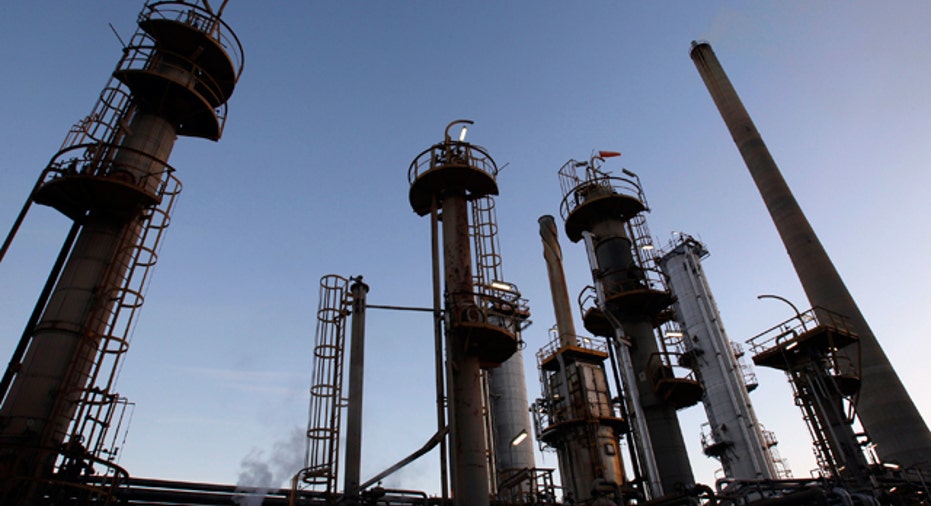Crude Oil Rally Wavers as Downside Risks Loom

Oil prices retreated from their push toward a three-week high as traders continued to debate the impact of attempts at economic stimulus and the possibility of output cuts from the world's big exporters.
Money managers have built up a record amount of positions on falling oil prices in recent weeks, betting that a 19-month fall in prices would continue as global oil supplies linger near record highs. That concentration of bearish betters has made the market vulnerable to price spikes as some jump out as quickly as they jumped in, but many have also shown a propensity to stick and double down against recent news suggesting the market could rebalance this year.
On Thursday Russia's energy minister said that his country could discuss 5% output cuts at a meeting in February with the Organization of the Petroleum Exporting Countries, the 12-nation oil producers' cartel. Early Friday, the Bank of Japan unexpectedly introduced negative interest rates for the first time, the latest in a string of central bank efforts to jolt struggling economies, potentially raising demand for oil and other consumer goods. But many remain skeptical of the impacts.
Light, sweet crude for settled up 40 cents, or 0.3%, to $33.62 a barrel on the New York Mercantile Exchange. It had climbed as high as $34.40 a barrel. Brent, the global benchmark, recently rose 44 cents, or 1.3%, to $34.33 a barrel on ICE Futures Europe.
Oil was up and down all day. It followed U.S. stocks higher after the Dow Jones Industrial Average shot up 1.3% shortly after it opened. But it then retreated, following a recent pattern of fading rallies. Many are selling oil as it rallies because they don't believe recent talk of collaboration on an output cut between major global exporters, analysts and traders said.
"The more days that go on, the less people believe it," said Todd Garner, managing partner at hedge fund Protec Energy Partners LLC in Boca Raton, Fla. "You're not going to get every (producer) to agree. If that was going to be the case, you would have done it a long time ago."
A senior OPEC official has already refuted the claim from Russia about cooperation on output cuts. Late on Thursday, Iran's oil minister Bijan Zanganeh said that his country hasn't been contacted for any consultations between OPEC and non-OPEC producers next month, according to the oil ministry's agency Shana. Also, a top Iranian oil official said Friday Iran "won't consider a cut" until its exports have increased by 1.5 million barrels a day over current levels of roughly 1.1 million barrels a day.
Saudi Arabia hasn't wavered from leading a group of OPEC's most powerful members to keep producing at full tilt to defend its market share amid competition from Russia, the U.S. and other non-OPEC producers. Before this recent trend, OPEC has traditionally cut output to support prices. Most of the recent comments from within OPEC about an emergency meeting to revive that role have come from members without the power to do it.
"At present we would judge these types of statements to be nothing more than verbal attempts to prevent the market from aggressively testing the downside," analysts at JBC Energy said in a note to clients.
Analysts say the fact that the market has rallied on the news of potential output cuts--despite the high level of uncertainty over whether supply would ultimately be cut--is due in part to prices having fallen so much in recent weeks.
"If the market's hopes were to be dashed and if everything turned out to have been just a game, prices would no doubt drop sharply again," Commerzbank said in a note.
Even the economic stimulus moves could fall flat for oil, analysts said. The market is too saturated for it to matter, said Roman Kazmin, the head of LNG Asia at ICIS.
If more central banks around the world adopt similar measures, the U.S. dollar would strengthen further, said Alex Poon, a vice president at Admis Limited, a futures brokerage firm in Hong Kong. As oil prices are denominated in dollars, a strong greenback means more expensive oil for traders holding foreign currencies.
Gasoline futures recently rose 0.3% to $1.0825 a gallon. Diesel futures rose 2.2% to $1.0533 a gallon.
Jenny W. Hsu and Benoît Faucon contributed to this article.
By Timothy Puko and Georgi Kantchev



















